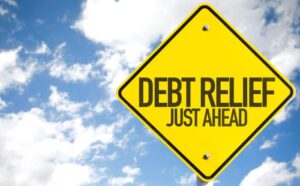
Debt relief is not just a buzzword; it’s the golden ticket out of the wild rollercoaster of financial woes! Imagine a world where the weight of your bills lifts off your shoulders, allowing you to dance through life like a carefree gazelle. In this thrilling journey, we’ll explore the various paths to financial liberation, from negotiating with creditors to the magical land of debt consolidation.
Buckle up as we embark on this adventure to reclaim your financial future!
As we dive into these debt relief strategies, you’ll discover diverse options tailored to individuals and businesses alike. We’ll decode the complex lingo of finance and unveil the secrets of budgeting like a pro. By the end, you’ll wield knowledge like a powerful sword in the battle against debt!
Debt Relief Strategies
Navigating the treacherous waters of debt can be more challenging than finding a unicorn at a petting zoo. However, fear not! With the right strategies, you can emerge victorious from the clutches of creditors. Let’s dive into the plethora of debt relief options available for both individuals and businesses.
Debt Relief Options
Several debt relief strategies exist that allow individuals and businesses to find some breathing space when finances get tight. Here are the notable options:
- Debt Settlement: This involves negotiating with creditors to reduce the total amount owed. Instead of paying the full amount, you might agree on a lesser sum that would satisfy the debt. Think of it as a financial “buy one, get one free” deal!
- Debt Consolidation: By combining multiple debts into a single loan, ideally with a lower interest rate, you can simplify your repayment process. It’s like decluttering your closet but for your finances!
- Bankruptcy: Though it should be considered a last resort, declaring bankruptcy can provide a fresh start by eliminating many debts. However, it’s like setting off a financial firework—a big bang, but cleanup is essential.
- Credit Counseling: Seeking professional help from credit counselors can give you personalized advice and strategies tailored to your situation. Sometimes we all need a little pep talk from a professional cheerleader!
Negotiating with Creditors
Negotiating with creditors may sound as daunting as wrestling a bear, but with a few strategies in your back pocket, it can be manageable. The key is to approach the situation with confidence and a plan. First, prepare a detailed list of all your debts, along with your income and expenses, so that you know exactly what you’re dealing with.
Then, reach out to your creditors. Here’s how you can make your plea more effective:
- Be Honest: Explain your financial situation truthfully. Creditors appreciate transparency; it’s like showing them your cards in a poker game!
- Offer a Lump Sum Payment: If you can gather some cash, offer it as a one-time payment to settle your debt. This can be more appealing than receiving small, regular payments over time.
- Stay Calm: Emotions can run high during negotiations, but keeping your cool can lead to better results. Think of it as trying to meditate while standing on a tightrope!
Creating a Budget for Effective Debt Management
Creating a budget is like drawing the map for your financial journey; it gives you direction and helps avoid potential pitfalls along the way. A well-structured budget will help you manage your debt effectively and prevent you from overspending. To build a budget that works, consider the following steps:
- Track Your Income: Know exactly how much money is coming in every month. This is your starting point, like knowing how much gas is in your tank before hitting the road.
- List Your Expenses: Categorize your expenses into fixed (rent, utilities) and variable (entertainment, dining out). This way, you can identify areas where you can cut back.
- Set Realistic Goals: Give yourself attainable financial goals to work towards each month. It’s like setting mini-milestones on a long hike!
- Adjust Regularly: Life changes, and so should your budget. Revisit it monthly to make sure it reflects your current situation and goals.
“A budget is telling your money where to go instead of wondering where it went.” – John C. Maxwell
With these strategies in your financial toolkit, you can tackle debt relief with a mix of savvy planning and a pinch of humor. Remember, every step counts on the path to financial freedom!
Financial Tools for Debt Management

Managing debt can feel like trying to tame a wild animal—it’s unpredictable and, at times, downright scary! But fear not, brave financial adventurer! With the right financial tools in your arsenal, you can transform that daunting debt into a manageable pet. Let’s dive into the exciting world of credit counseling services, debt consolidation loans, and home equity loans, and see how they can help you take back control of your finances.
Credit Counseling Services
Credit counseling services are like your friendly neighborhood financial superheroes. They swoop in to save the day when debt starts to feel overwhelming. These services offer personalized advice and support, helping you to create a budget and develop a plan to manage your debt effectively. They’re equipped with the knowledge to negotiate with creditors on your behalf and can provide education on responsible credit use.
Here’s what you can expect from credit counseling services:
- Budget Creation: They’ll help you draft a budget that balances your income with your expenses, ensuring you have enough left over for those essential pizza nights.
- Debt Management Plans: Many services will set you up with a structured plan, allowing you to make one monthly payment to them, which they’ll then distribute to your creditors. Think of it as the “all-in-one” solution for your payments!
- Negotiation with Creditors: Learning the ropes of debt can be tough, but credit counselors often have relationships with creditors and can negotiate lower interest rates or reduced payments. It’s like having a financial wingman during a tough negotiation!
- Financial Education: They provide resources and workshops to improve your financial literacy, helping you to avoid debt traps in the future. Knowledge is power, after all!
“They say money can’t buy happiness, but let’s be honest: a solid budget and a little financial education can sure make life a lot easier!”
Debt Consolidation Loans
Debt consolidation loans are your trusty Swiss Army knife in the debt management toolkit. They allow you to combine multiple debts into a single loan with a potentially lower interest rate. It’s like gathering all your scattered puzzle pieces and creating a beautiful picture, instead of a chaotic mess. Here’s a simple guide on how to effectively use debt consolidation loans:
- Assess Your Debts: Before you take the plunge, list all your outstanding debts, including interest rates. This will help you determine if consolidation is a smart move.
- Shop Around for Rates: Not all loans are created equal. Compare offers from multiple lenders, looking for the best interest rate and terms that suit your needs.
- Calculate Your Savings: Use an online calculator to estimate how much you’ll save in interest and monthly payments compared to your current debts. If it feels like a good fit, it’s time to move forward!
- Stay Disciplined: After consolidating, avoid accumulating new debts. It’s like going on a diet; you can’t sneak in those donuts if you want to see the results!
“Debt consolidation is not just about merging your debts; it’s about merging your peace of mind into one neat package.”
Home Equity Loans
Home equity loans are like that loyal friend who’s always got your back—your home’s equity can be a powerful resource when it comes to tackling debt. By borrowing against the equity you’ve built in your home, you can secure funds to pay off high-interest debts. Here’s how to make the most of home equity loans for debt relief:
- Understand Your Equity: First, determine how much equity you have in your home. This is typically calculated by subtracting your mortgage balance from your home’s market value. It’s like measuring the value of your treasure chest!
- Loan Types: Choose between a home equity loan (lump sum payment) or a home equity line of credit (revolving credit). Think of it as deciding between a one-time feast or an ongoing buffet!
- Compare Interest Rates: Interest rates on home equity loans are usually lower than credit cards, making this a savvy option for paying off high-interest debts.
- Use Wisely: Avoid the temptation to use these funds for unnecessary purchases. Stick to paying off debts to reap the full benefits—like a financial detox!
“Remember, while home equity loans can open doors to debt relief, they also come with the risk of your home being on the line, so tread carefully!”
Understanding Financial Terms Related to Debt Relief

Navigating the world of debt relief can often feel like trying to understand the mating habits of rare exotic birds—confusing and filled with obscure terminology! However, once you get acquainted with key financial terms, the world of dollars and cents will start to make a little more sense. Let’s untangle some financial jargon that’s crucial to your journey toward debt relief and management.
Key Financial Terms Related to Debt Relief
Understanding the lingo of finance is like having a good map in a treasure hunt; it guides you to hidden treasures (or in this case, relief from debt). Here’s a concise list of essential terms that will help you navigate the landscape of debt relief:
- Debt Consolidation: This is when you combine multiple debts into a single loan, often to secure lower interest rates. Think of it as putting all your pesky debt cockroaches in one jar. Less chaos, right?
- Credit Score: A numerical representation of your creditworthiness. It’s like a report card for adults, except instead of grades, you get to see how many creditors are willing to let you borrow their money. Spoiler: Higher is better!
- Bankruptcy: A legal process through which individuals or businesses can seek relief from some or all of their debts. It’s like hitting the reset button on your financial game, but it comes with its own set of challenges.
- Debt Settlement: This involves negotiating with creditors to pay a lump sum that is less than the full amount owed. It’s like haggling at a flea market but for your financial obligations.
Currency Trading and Its Impact on Personal Finance
Currency trading, or forex trading, is where the real magic (and, let’s be honest, chaos) happens. It’s a colossal market where currencies are bought and sold, influencing global economies and your personal wallet in unexpected ways. Here’s why it matters:
- Currency fluctuations can affect your purchasing power. If you’re planning a vacation overseas, a strong dollar means you can buy more souvenirs (or snacks, let’s be real).
- Understanding currency trading can lead to investment opportunities. Some people make a living off buying and selling currencies, while others simply end up with a collection of foreign coins as conversation starters.
- The forex market operates 24/7, which means you can trade while wearing your pajamas! However, keep in mind that just like a wild rollercoaster, it comes with risks and unpredictability.
Leasing Versus Buying Assets in the Context of Debt
When it comes to acquiring assets, the age-old debate between leasing and buying is akin to choosing between chocolate cake and a fruit salad—both have their pros and cons! Here’s a comparison to help you evaluate which might be more suitable for managing your debt:
- Leasing: Often requires lower upfront costs and can be easier on the budget. Think of it like renting a trendy apartment—you’re living in style without the burden of hefty mortgage payments.
- Buying: While it may involve a higher initial investment, purchasing an asset means you build equity. It’s like planting a money tree that, with time, can yield a great harvest (if you keep it well-watered, of course).
“Debt relief isn’t just about cutting costs; it’s about reshaping your financial journey and dancing your way to a brighter future!”
Epilogue
So, there you have it—your comprehensive roadmap to debt relief! Armed with strategies, tools, and a sprinkle of humor, you’re now ready to tackle your financial challenges head-on. Remember, debt relief isn’t merely about numbers; it’s about reclaiming the joy of living without financial fear. Go forth, implement these tips, and watch as you transform into the financial superhero you were always meant to be!
FAQ Resource
What is debt relief?
Debt relief refers to strategies and processes aimed at reducing or eliminating debt burdens, allowing individuals or businesses to regain financial control.
Who qualifies for debt relief programs?
Typically, individuals or businesses experiencing financial hardship may qualify, depending on specific criteria set by each program.
How long does it take to see results from debt relief?
Results vary depending on the strategy employed, but many experience noticeable changes within months of taking action.
Can debt relief affect my credit score?
Yes, certain forms of debt relief can impact your credit score, but the long-term benefits often outweigh the short-term effects.
Is bankruptcy a form of debt relief?
Indeed, bankruptcy is a legal form of debt relief that can discharge debts but comes with significant long-term consequences.







